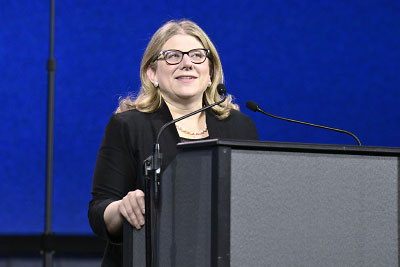Outgoing APA President Describes Roadmap for Meeting a Unique Opportunity
Abstract
During her presidential year, Brendel led the development of a “Roadmap for the Future,” a remarkable strategic vision to help psychiatry and APA meet the challenges of this unique moment and lead the profession into the future as leaders of the mental health workforce.
With mental health for the first time at the forefront of national and international attention, psychiatry and APA have an unprecedented opportunity, said outgoing APA President Rebecca Brendel, M.D., J.D., at the Opening Session of APA’s Annual Meeting.
The challenges are also equally unprecedented. “The last time we were together here in San Francisco, back in 2019, we had no idea that a global pandemic was just around the corner, bringing with it the most disruptive—and defining—event of a century,” she said. “And now, as we come back together, we have just turned the page on the COVID-19 pandemic with the official end of the Public Health Emergency just over one week ago. But as the viral contagion of the COVID-19 pandemic subsides, we find ourselves amid a second pandemic, a mental health pandemic.

“We cannot make meaningful progress for our profession or our patients alone,” said outgoing APA President Rebecca Brendel, M.D., J.D. “We will need to innovate and work in teams of care to expand the reach of our workforce.”
“Americans are experiencing high rates of loneliness, anxiety, and depression, and we are losing approximately 150,000 Americans to suicide and opiate overdose each year,” Brendel said. “The challenges before us are great, and we must rise to the call of meeting society’s unprecedented need for treatment for mental health and substance use disorders. We are at a unique moment to do this work.”
During her presidential year, Brendel led the development of a “Roadmap for the Future,” a remarkable strategic vision to help psychiatry and APA meet the challenges of this unique moment and lead the profession into the future as leaders of the mental health workforce.
“Even with increases in training slots, it will not be enough to rise to the challenge of providing care to every American who needs it,” she said. “We cannot make meaningful progress for our profession or our patients alone. Instead, we will need to innovate and work in teams of care to expand the reach of our workforce.”
At the core of the Roadmap for the Future “is the pivotal question of how psychiatry and APA can continue to position ourselves at the forefront of mental health research, care, and delivery,” Brendel said. “APA now has a strategic plan unanimously adopted by the Board and currently being implemented by the APA administration to meet goals now and into the future. This roadmap has the potential to position psychiatry and APA as the research, thought, and practice leaders in mental health for generations to come.”
The strategy includes leveraging and advancing DSM, growing the PsychPRO registry, investing in clinical practice guidelines to set the evidence-based standards of practice among mental health professionals of different disciplines, developing quality measures to assess and improve care, and preparing psychiatrists for future practice challenges. “This work will support and advance APA’s advocacy to establish the necessary foundation to structure, fund, and advance psychiatric care,” Brendel said.
Brendel recounted a year of successes in federal and state advocacy and in public engagement. “Spearheaded by our Policy and Government Relations teams, APA secured key victories on parity enforcement, telehealth flexibility, funding and support for collaborative care, and a five-year reauthorization of the SAMHSA minority fellowship program to foster diversity in APA and the psychiatric workforce,” she said.
Other key initiatives included securing an additional 100 graduate medical education slots for each residency year in psychiatry and its subspecialties.
One of the most important communications initiatives this year, Brendel said, was a focused effort to reach out to communities that have been historically excluded.
“APA is making long overdue strides in this area, including the launch of Spanish-language press releases and LaSaludMental.org, APA’s bilingual Spanish/English-language website containing evidence-based, culturally informed resources designed and developed by APA member psychiatrists specifically for Hispanic persons in the U.S. APA will continue to build on the success of this initiative with expanded outreach and educational efforts for members of other racial, ethnic, and cultural communities.”
Brendel also hailed APA’s outreach internationally. “With the Roadmap for the Future, our voice and expertise have led to collaborations with global colleagues on team-based models of care and also provided ethical and practice leadership for a world in sociopolitical flux. One example of this impact is our work with psychiatric leaders from around the world in supporting Ukraine.
“In ongoing meetings with Ukrainian and other global psychiatric leaders over the course of this year, a broad collegiality and commitment have grown not only to assist our Ukrainian colleagues but to continue to foster our relationships in the interest of promoting global mental health.” ■



